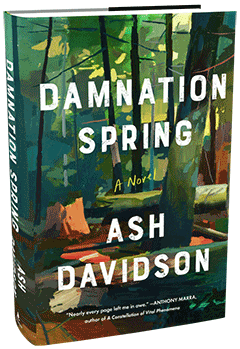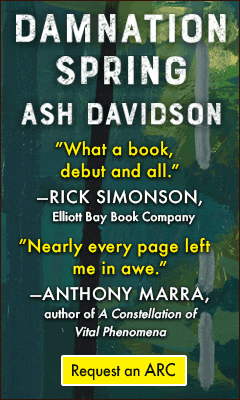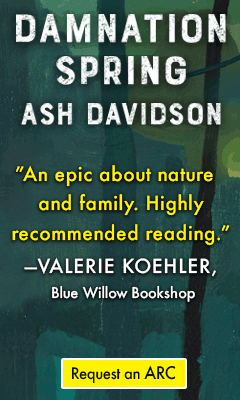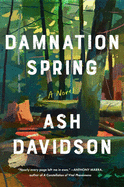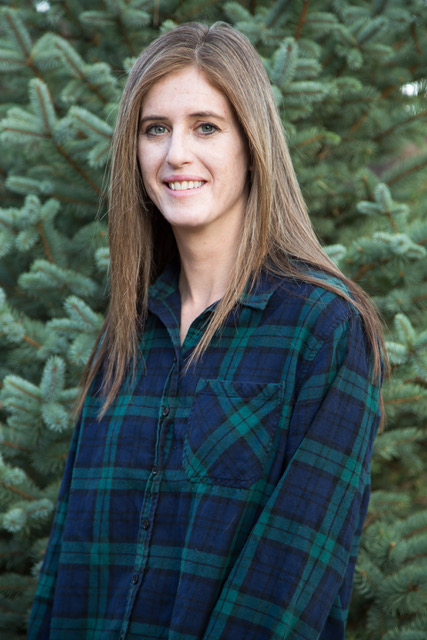Damnation Spring
by Ash Davidson
In this astonishing debut novel from Scribner, a 1970s logging town is torn by conflict when environmental failings jeopardize the livelihood of locals and the foundation of a marriage itself.
Rich Gundersen comes from generations of redwood loggers; a high-climber, he scales 300-footers, gambling his 53 years to prep trees for cutting. His inheritance is a bounty: the legendary 24-7--a tree 30 feet wide, 370 feet tall, that every Gundersen has dreamed of felling. The incredible opportunity arises to buy the 24-7 inholding--a ridge of redwoods that includes Rich's dream tree. Its $1 million worth of lumber would ensure his son, Chub, never needs to log. But without a road to truck out the timber, it's worthless. Without telling his wife, Colleen, Rich empties their savings account to buy the land, gambling that he'll have a road once his employer, Sanderson Timber Co., constructs it for its Damnation Grove project.
His plan topples when operations pause on Damnation Grove over concerns that more clearcutting in Klamath will trigger mudslides, destroy salmon spawning grounds and contaminate creeks with defoliants. The company has always stood by the herbicides, but the safety of the Gundersens' drinking water is in question. But if Sanderson can't spray, Rich won't get the road to the 24-7 ridge--the only hope of paying the mortgage after what he spent for the land, and his last shot at felling the 24-7. The tree is a family legacy. But so is Chub. And so, too, would be the children he and Colleen might now have, if her eight other pregnancies had gone to term. Pregnancies she now believes failed because of poisoned water.
Colleen wants to say something, but she has seen how the Yancy family, whose baby was born with anencephaly, is harassed for faulting the herbicides. The cessation of logging has put everyone in town "on the razor edge of broke," fueling discrimination against the already mistreated local Yurok Tribe, who are pushing back against the contamination.
Caught between two factions, Rich's focus intensifies on what he has always strived to do: protect his family. That becomes increasingly difficult when Colleen decides she can't stay quiet any longer, and the town chooses sides in a dangerous battle for a timber kingdom whose prince--Merle Sanderson--aims to claim his lumber at all costs, environmental and human.
Set over the course of one dramatic year, and told from the perspectives of Rich, Colleen and Chub, Damnation Spring by Ash Davidson is a big American novel about familial love, town politics and the irreversible impacts of a declining industry that dooms forests. Via the divided citizens of Klamath, Davidson elucidates the complexities of logging communities--it's not as simple as just stopping when it's an entire town's livelihood. She achieves this by conjuring a powerful sense of place, inhabited by authentic individuals who want only what they deserve: a healthy family. The women especially have suffered loss, whether of children or fathers or husbands, and Davidson depicts the varied ways they mourn--denying reality, sitting on the truth, speaking out--with tact and sensitivity. Likewise, the men, all aware their deaths are written in the trees, are imbued with purpose, intent on providing for their families. Yet Davidson is careful not to portray imbalance between the sexes; though it's the men who log, Davidson empowers her women with the gumption to transform their grief and worry into actions--sometimes small, sometimes radical--that effect change.
Also marking Damnation Spring as a stunning literary achievement is its transportive prose. Davidson's immersive sensory descriptions put readers on the "muddy pulp" of trails reminiscent of "damp-soft Oreos," through geraniums "soft like the velvet between a horse's nostrils," beneath redwoods that tower "like the comb of a rooster" and into "woolly fog" dense enough to "pull long white beards of it from the air."
Davidson's natural settings come alive--a drizzle "like someone walking backward in front of her with a bowl of water, flicking it in her face"--but it's the clarity in her everyday backdrops that resonate most strongly. A water dispenser "gurgling digestively." Onions tossed into a pan with "an angry sizzle." "The phone ringing furiously, threatening to jump off the kitchen wall." Such tangible details also elevate each character's presence: hands "rough enough to strike a match off"; a shriek of laughter "turning to confetti in the air"; a "woman whose raised eyebrow could lower the temperature of a room"; an "Adam's apple that made swallowing look painful."
Davidson accompanies her precise imagery with skillful use of parallelism and symbolism. An unsolved crossword clue ("Desires. Four letters") sits on the tip of Colleen's tongue for months, similar to how the future she wants is tauntingly out of reach. In the pre-dawn hours, Rich views the lit kitchen window as a beacon, suggestive of a lighthouse that is both beckoning him to a safe harbor and warding him from wrecking on its dangerous emotions. That love--the invisible "rope tied around [Rich's] waist on one end and around [Colleen's] on the other"--is at the core of this tumultuous family saga about the harrowing consequences of environmental collapse. Driven by vivid, sympathetic characters who sparkle with intensity, Damnation Spring is a portrait of love and longing, and their herculean influence. --Samantha Zaboski



